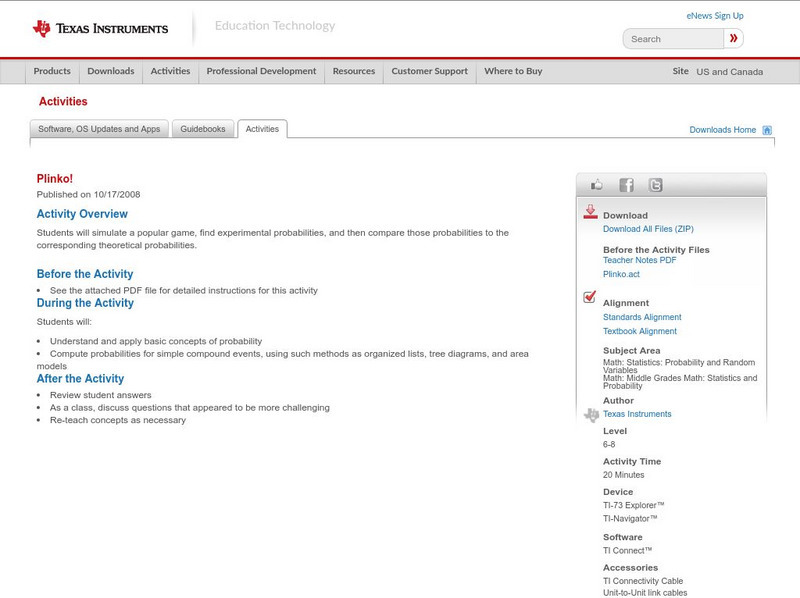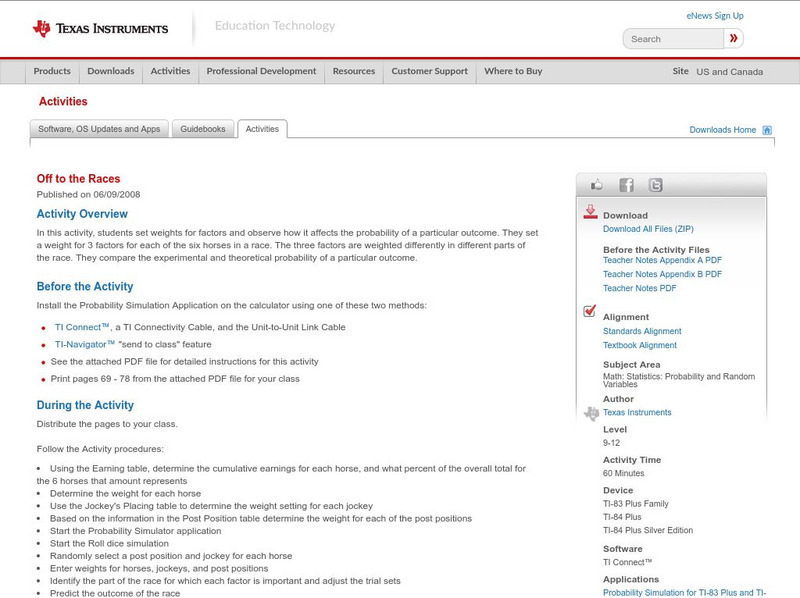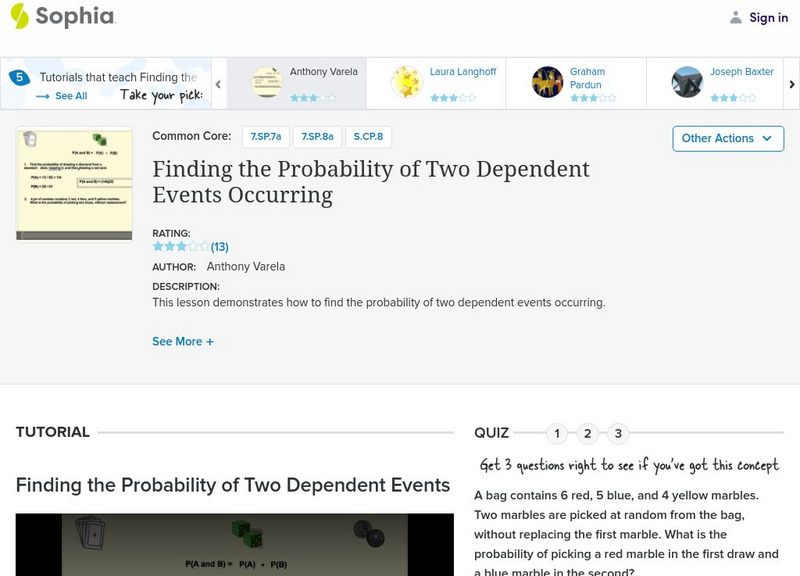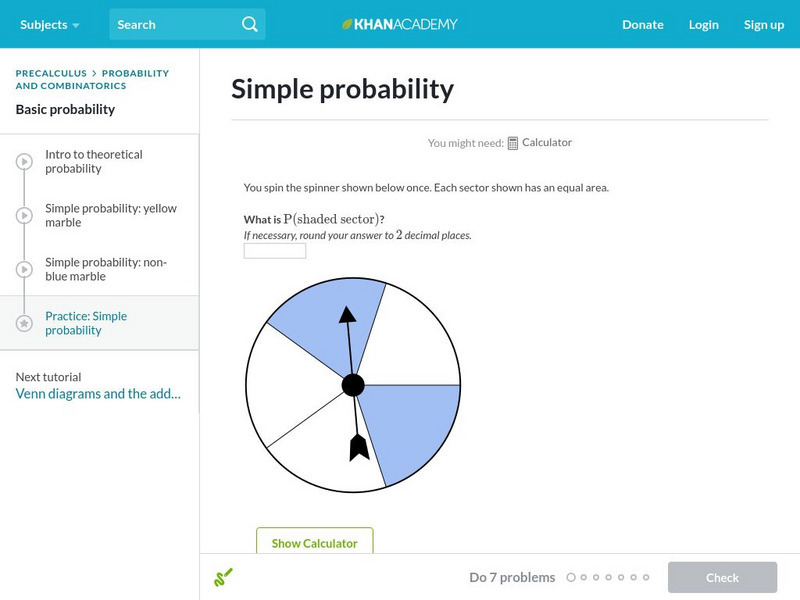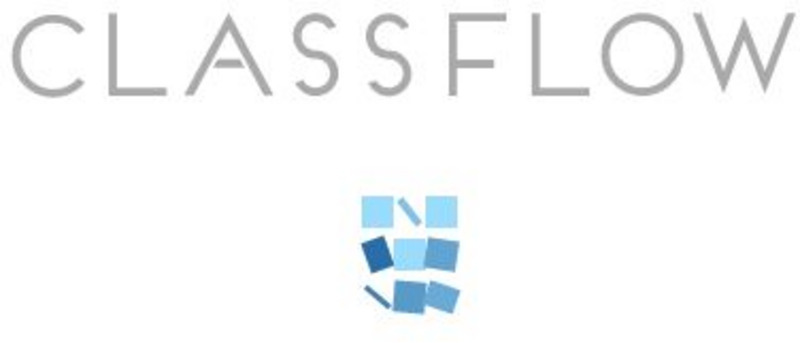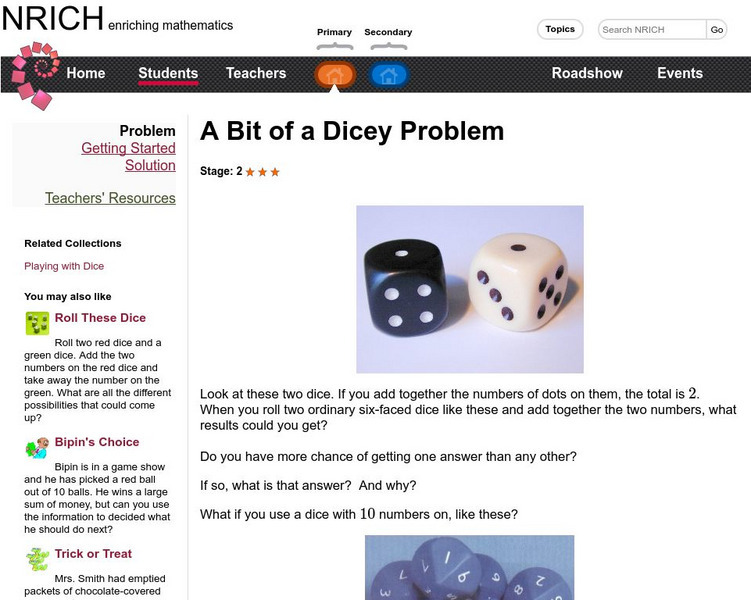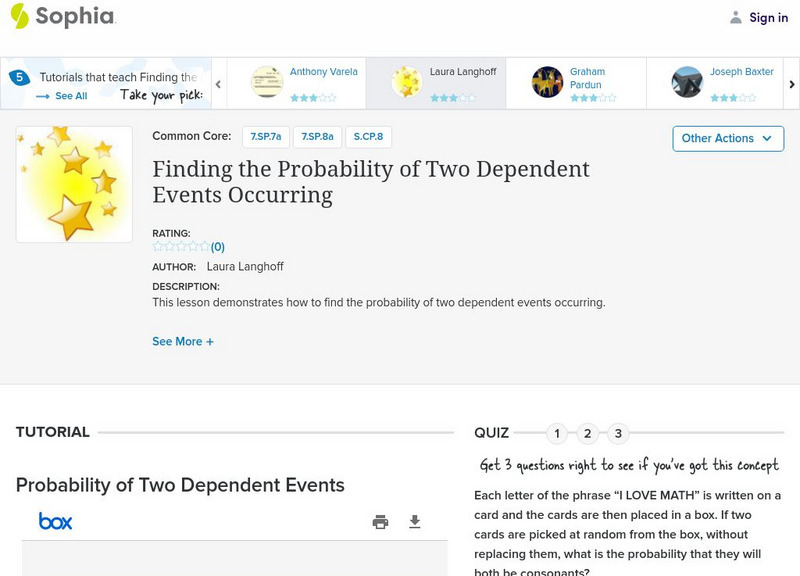Shodor Education Foundation
Shodor Interactivate: From Probability to Combinatorics and Number Theory
Apply division to determine the probability of outcomes with a racing game.
PBS
Pbs Mathline: The Smithville Families Lesson Plan [Pdf]
A coin is used to determine the birth of children and the learners are to determine the probability of whether the child is boy/girl. Printable lesson.
McGraw Hill
Glencoe: Self Check Quizzes: Theoretical Probability
Use Glencoe's randomly generated self-checking quiz to test your knowledge of theoretical probability. Each question has a "Hint" link to help. Choose the correct answer for each problem. At the bottom of the page click the "Check It"...
Texas Instruments
Texas Instruments: Plinko!
In this activity, students will simulate a popular game, find experimental probabilities, and then compare those probabilities to the corresponding theoretical probabilities.
Texas Instruments
Texas Instruments: Analyzing Number Cube Sums
In this activity, students extend their understanding of theoretical probability and patterns. They use number cubes, to build awareness that a fraction and its decimal and percent representation on the calculator are "close," but not...
Texas Instruments
Texas Instruments: Will Girls and Boys Be Equal?
Students explore concepts in probability and statistics. In this activity, they model a situation to find experimental probability and construct a box-and-whisker plot. They compare the experimental and theoretical probabilities for the...
Texas Instruments
Texas Instruments: You're Probably Right, It's Wrong
In this activity, students perform a simulation to guess answers on a test and determine the experimental probability of passing the test. They then compare it with the theoretical probability.
Texas Instruments
Texas Instruments: Off to the Races
In this activity, students set weights for factors and observe how it affects the probability of a particular outcome. They set a weight for 3 factors for each of the six horses in a race. The three factors are weighted differently in...
Khan Academy
Khan Academy: Simple Probability
In this exercise, students practice finding simple probability. Students receive immediate feedback and have the opportunity to get hints and try questions repeatedly.
Houghton Mifflin Harcourt
Holt, Rinehart and Winston: Homework Help Independent Practice: Theoretical Probability
Get independent practice working with theoretical probability. Each incorrect response gets a text box explanation and another try. Correct responses are confirmed.
Sophia Learning
Sophia: Finding the Probability of Two Dependent Events Occurring: Lesson 4
This lesson demonstrates how to find the probability of two dependent events occurring. It is 4 of 4 in the series titled "Finding the Probability of Two Dependent Events Occurring."
Khan Academy
Khan Academy: Simple Probability
Practice finding probabilities of events, such as rolling dice, drawing marbles out of a bag, and spinning spinners. Students receive immediate feedback and have the opportunity to try questions repeatedly, watch a video or receive hints.
Khan Academy
Khan Academy: Theoretical and Experimental Probability: Coin Flips and Die Rolls
A set of questions on experimental and theoretical probabilities using coins and dice. Answers are accompanied by explanations.
National Council of Teachers of Mathematics
Nctm: Illuminations: Adjustable Spinner
An interactive game for learning theoretical vs experimental probability.
Alabama Learning Exchange
Alex: Puzzling Pangaea
In this lesson students will work collaboratively to research information in order to prove or disprove if a super continent ever existed. Students will create a model of Pangaea to show how their research findings 'connect' in a puzzle...
Sophia Learning
Sophia: Sampling and Prediction: Lesson 3
This lesson demonstrates how sampling can help predict outcomes. It is 3 of 2 in the series titled "Sampling and Prediction."
Sophia Learning
Sophia: Sampling and Prediction: Lesson 1
This lesson demonstrates how sampling can help predict outcomes. It is 1 of 2 in the series titled "Sampling and prediction."
Sophia Learning
Sophia: Sampling & Predictions
This lesson demonstrates how sampling can help predict outcomes.
ClassFlow
Class Flow: Probability
[Free Registration/Login Required] This flipchart takes the student through activities regarding theoretical and experimental probability and expressing the probability in mathematical terms.
ClassFlow
Class Flow: Probability Starter: Handling Data
[Free Registration/Login Required] Students are introduced to the concept of theoretical and actual probability in a variety of contexts.
University of Cambridge
University of Cambridge: Nrich: A Bit of a Dicey Problem
Short website offers a look into the theoretical probability of tossing dice. Several questions related to the throwing of dice are included.
University of Cambridge
University of Cambridge: Nrich: In a Box
This probability problem encourages the learner not only to arrive at a solution, but also to defend it.
Sophia Learning
Sophia: Finding the Probability of Two Dependent Events
This lesson demonstrates how to find the probability of two dependent events occurring.
Sophia Learning
Sophia: Finding the Probability of Two Dependent Events Occurring: Lesson 1
This lesson demonstrates how to find the probability of two dependent events occurring. It is 1 of 4 in the series titled "Finding the Probability of Two Dependent Events Occurring."



![Pbs Mathline: The Smithville Families Lesson Plan [Pdf] Lesson Plan Pbs Mathline: The Smithville Families Lesson Plan [Pdf] Lesson Plan](https://d15y2dacu3jp90.cloudfront.net/images/attachment_defaults/resource/large/FPO-knovation.png)

